
Your life is often planned before you are born. Parents and grandparents want to sketch your every day from where you might attend preschool to the college embossed on your graduate diploma, what career ladder you will follow, the type and color of home you will purchase (or inherit), and even the names of your 2.5 beautiful children. There is one slight problem: No one ran these grand ideas by you.
Life; sometimes it becomes complicated when older and well-meaning family members attempt to impose their expectations on you. After all, your parents married at 19 but believe you should wait until at least 25 to tie the knot. But have they ever asked what you want?
To get a feel for how a younger generation’s lifestyle and career goals might differ from those of their elders, we surveyed 915 individuals between the ages of 18 and 81. Read on as we explore the similarities and differences of various generations.
Spinning the wheel of “Life”
“The Game of Life” was first created in 1860 by Milton Bradley as “The Checkered Game of Life” and quickly became a favorite nineteenth-century parlor game.
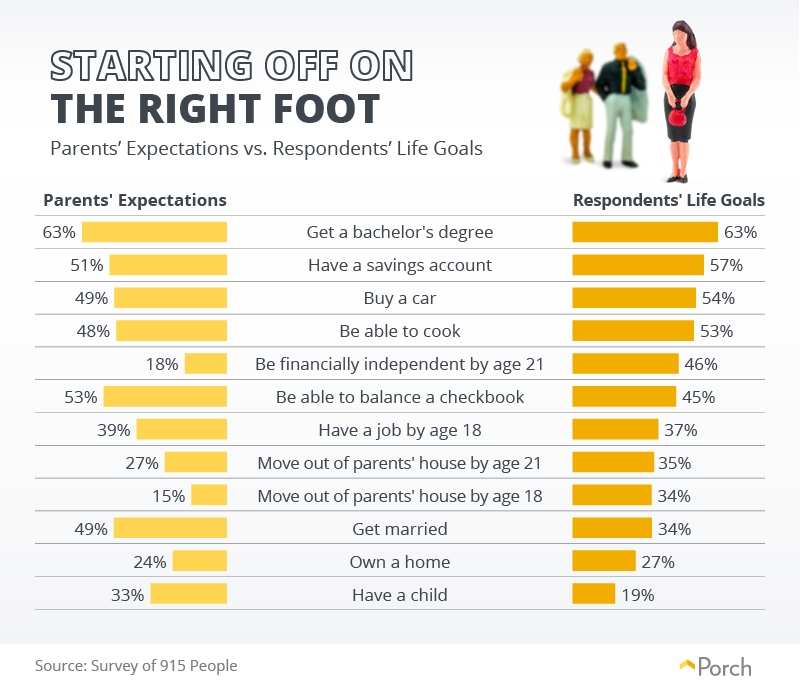
An updated, modern version was reintroduced in 1960 and took Americans on an imaginary journey by spinning a numbered wheel, which ultimately led you to such monumental moments as marriage, an incredible career, or lots of cash. Sometimes it left you penniless and living at the “poor farm.”
Reality tells us that our individual lives shouldn’t be determined by a random spin of the wheel but instead by following our own interests and personal goals. Such, mom and dad’s advice is often helpful and sometimes even followed, albeit an individual’s goals and their parents’ plans don’t always align.
We asked respondents a series of questions about their life goals from ages 18 to 25, compared to what they thought their parents’ expectations were during the same period.
Obtaining a bachelor’s degree was an objective of 63 percent of our respondents during that time period, and, amazingly, respondents said the same percentage of their parents wanted them to achieve that objective as well. In fact, recent census numbers report that just over one-third of Americans have a four-year college degree, with younger Americans more likely to have an undergraduate degree than their older counterparts.
Coming in second, at 57 percent, was the goal of starting out on firm financial footing by establishing a savings account (you might recall your grandmother calling it a “rainy day” fund). Saving money, whether for emergency needs or retirement, was something 51 percent of our respondents said was also a goal of their parents.
There were other areas where respondents’ early life goals aligned with their parents’ aspirations, like buying a car (54 to 49 percent, respectively), learning to cook (53 to 48 percent), buying a home (27 to 24 percent), and balancing a checkbook (45 to 53 percent).
As expected, there were also differences. For example, 46 percent of respondents said being financially independent by age 21 was a goal, yet only 18 percent thought their parents felt the same. And when it came to living at home, 34 percent said they wanted to be out of their parents’ house by age 18, while 15 percent of parents shared the same plan.
One significant difference was in relation to becoming a parent: Nineteen percent said raising little ones was a goal of theirs, compared to 33 percent suggesting it was a desire of Mom and Dad.
Gen Xers feel the pressure to hold down a job early
Most everyone has experienced pressure from family members to obtain a milestone by a certain age or possibly attend the same college as their great-grandfather.
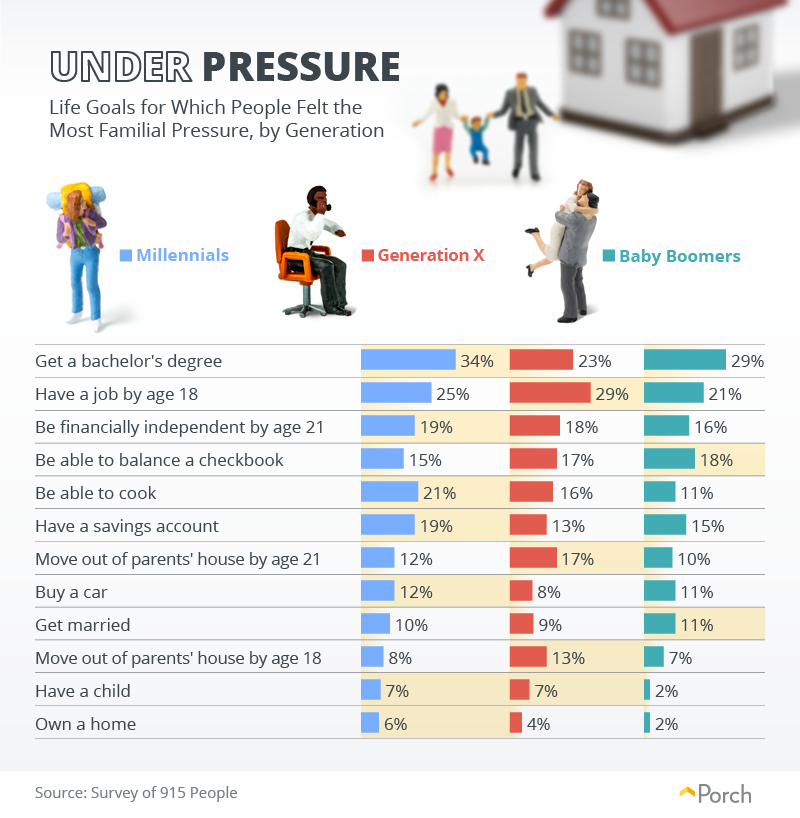
Acquiring a good education has long been most parents’ dream for their children. When servicemen and women came home from World War II, thousands took advantage of a government incentive for them to attend college, commonly known as the GI Bill of Rights. For many, they were the first in the family to expand their education beyond high school; thus they tend to want the same for their children.
Feeling pressure to obtain a bachelor’s degree topped the list for millennials in our survey at 34 percent. Additionally, 29 percent of baby boomers felt squeezed to achieve a four-year, post secondary degree, followed by Gen Xers at 23 percent.
Although the job you hold as a teenager won’t necessarily determine your ultimate career, parents often want to see their children working at least part time by their 18th birthday.
One of the more intriguing findings was the pressure parents put on respondents to have a job by age 18. The part-time food server or retail associate position you have in high school or college may not lead to your ultimate career, however, many parents like to see their children learn the responsibilities of holding down a job.
At 29 percent, Gen Xers felt this pressure more than millennials (25 percent) or baby boomers (21 percent). Gen Xers also experienced more pressure than the other two generations to leave Mom and Dad’s basement by age 18, too.
Only a small percentage of all three generations said parents had pressured them to become homeowners.
Meeting life’s goals, by age
What is the right age to marry, purchase your first home, or have children? Chances are the answers to those and similar questions depend on a variety of issues.
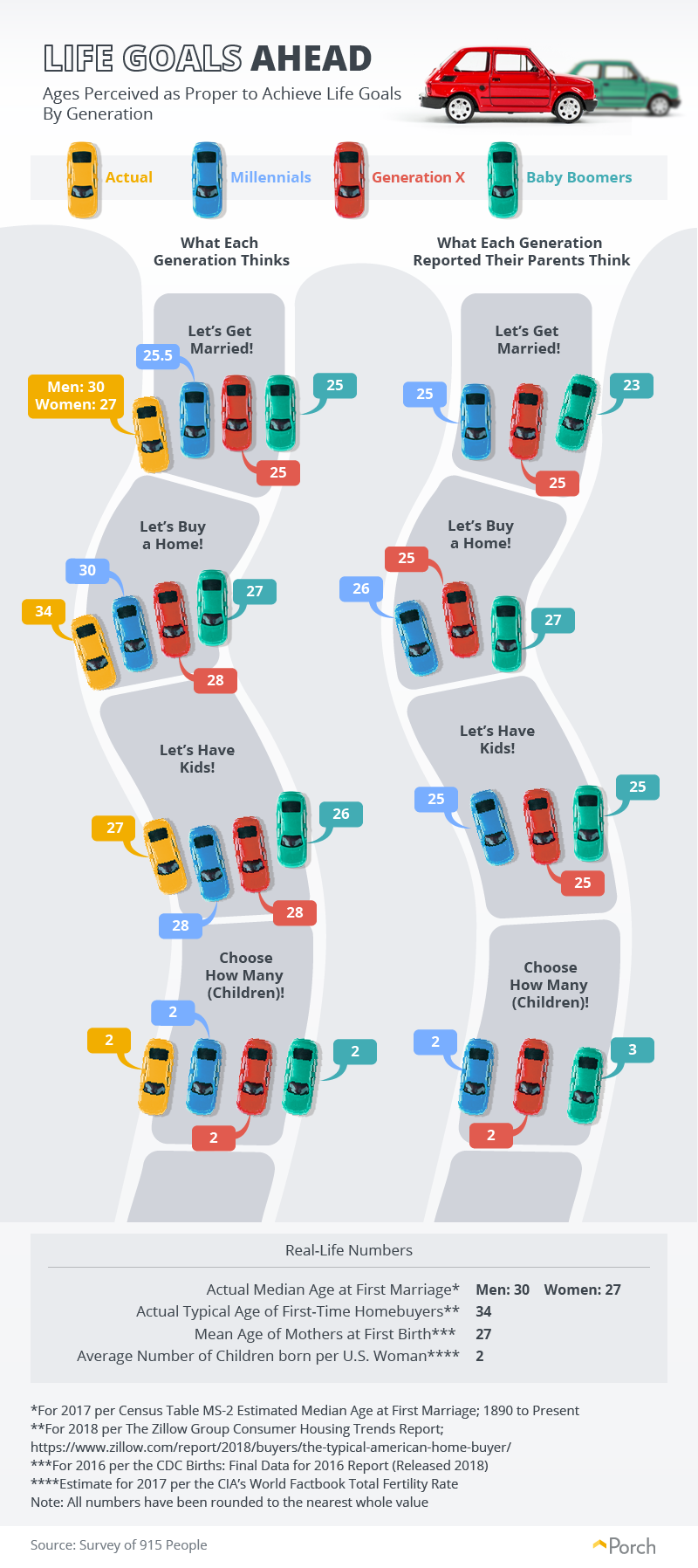
Marriage seems to be the life situation people are asked about most often. Whenever we meet new people and are learning about them, inquiring if they are married, single, or divorced is at the top of the list.
So, what is the “proper age” for marriage? According to all three generations, 25 is the golden number.
Both millennials and Gen Xers also said their parents told them 25 was the right age to tie the knot; however, baby boomers indicated their parents had told them 23 was a good age.
Recent data from the U.S. Census Bureau indicated the average median age for a first marriage in 2017 was 28 for women and 30 for men. Bureau stats go back to 1890; in that time, the lowest median age for marriage for women was 20 in 1958, and the lowest average for men was about age 22 around 1961.
What about buying a home? This is where the generations differ. Millennials thought 30 was a good age to sign away at the closing table. Gen Xers, on the other hand, said 28 was the right age, with baby boomers saying age 27 was best for a mortgage.
Having the desire to purchase a first home doesn’t always translate into the ability to finalize a purchase.
Policy groups such as the Urban Institute are reporting that millennials between 25-34 aren’t buying home at the same rate as Gen Xers or baby boomers did at similar ages. They provide several reasons, such as millennials marrying at later ages and being saddled with high student loan debt. Additionally, many millenials in urban areas pay higher rental rates – when combined with other issues – make it difficult to save up enough for a down payment.
Millennials in our survey indicated 28 was the right age to have children, and their Gen X peers agreed. Baby boomers, already accustomed to making major life decisions at an earlier age, thought 26 was the right time. But what about their parents? All three generations said their parents wanted them to deliver a grandchild at 25. All three generations also thought to raise two children was best (though boomers’ parents thought three children made a complete family).
Judging the life goals of their children
Most children want their parents to be proud of them and support the critical decisions they make.
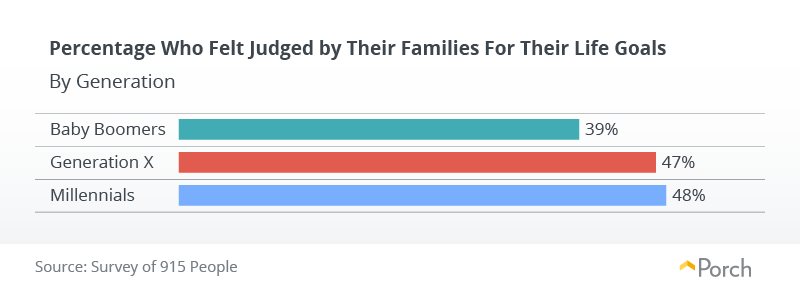
There are times we may perceive our parents as judging our actions, while other times they may demonstrate their opinions through words or actions.
More than the other two generations, 48 percent of millennials felt judgment from their parents in relation to life goals. Close behind were Gen Xers (47 percent), with baby boomers further still (39 percent).
The unpleasantness of parental disappointment
The game of life can throw us a curveball from time to time, and when we make major or controversial decisions, it can become a sensitive issue for some of our closest friends and family members.
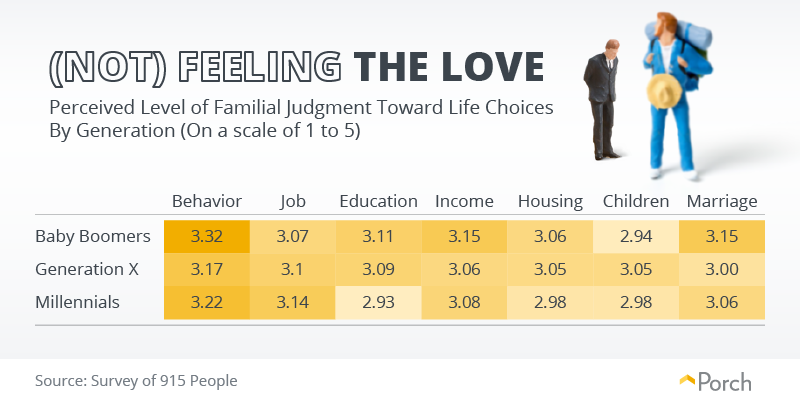
Respondents were asked to rate their perception of feeling judged by their family members in relation to significant life choices on a scale of 1 to 5, with 1 being not judged at all and 5 being judged often or always.
Purchasing a home is one of the most complex and expensive decision most of us make, so it’s easy to see how not choosing the right style, location, or size can invoke criticism from relatives. Of the three generations, millennials felt the least amount of pressure from relatives when it came to housing choices, whereas both baby boomers and Gen Xers felt slightly more judged.
How relatives respond to behavior is also a sensitive area. Baby boomers, followed by millennials and Gen Xers (3.32, 3.22, and 3.17 on our scale, respectively) felt their behaviors weren’t satisfactory to some relatives.
Further, whom you marry can sometimes be a contentious issue within a family. Aunt Sarah thinks the person you dated your senior year of high school was the perfect mate and continues to mention it at each family gathering after her second cocktail, while you quickly try to restrain your spouse from emphatically rolling their eyes in her general direction. Baby boomers felt the most judgment in relation to their marriage situation; however, all three generations said they believe they are moderately judged in this category.
Work; is it a passion or a chore?
For some, Monday mornings come too quickly. Others cannot wait to place their feet on cold, hardwood floors and start the day, carefully executing a series of meetings and appointments doing what they love. Depending on how you look at it, work can either be a pain or a pleasure.
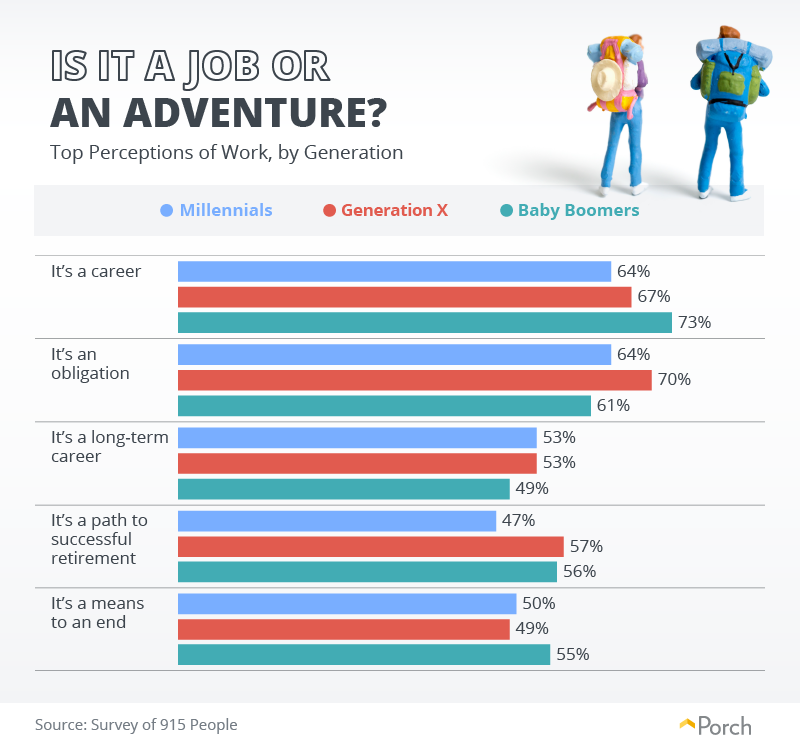
We endeavored to determine how the generations perceived their profession. The question was simple: What comes to mind when you think of work?
More than the other two generations, 73 percent of baby boomers said they view their jobs as a career, while 70 percent of Gen Xers said they view their 9-to-5 roles as an obligation. Half of the millennials surveyed said their jobs are just a means to an end. Further, baby boomers and Gen Xers were much more likely than millennials to think their job offered a path to a successful retirement.
Still others view their jobs as simply a means to an end; just a way to earn enough money to pay the mortgage, put food on the table and hopefully have some left over for hobbies, vacations and retirement. That’s exactly how 55 percent of baby boomers in our survey responded. Only half of millennials stated the same, followed closely by 49 percent of Gen Xers.
The good news is 53 of millennials and Gen Xers take a long-term view of their daily duties, seeing them as lasting careers.
Midlife money; how much is enough?
When you meet others for the first time you may be asked questions like “What do you do for a living?” or “Where do you work?” can sometimes be code for, “How much money do you make?” or “What is you social status?”
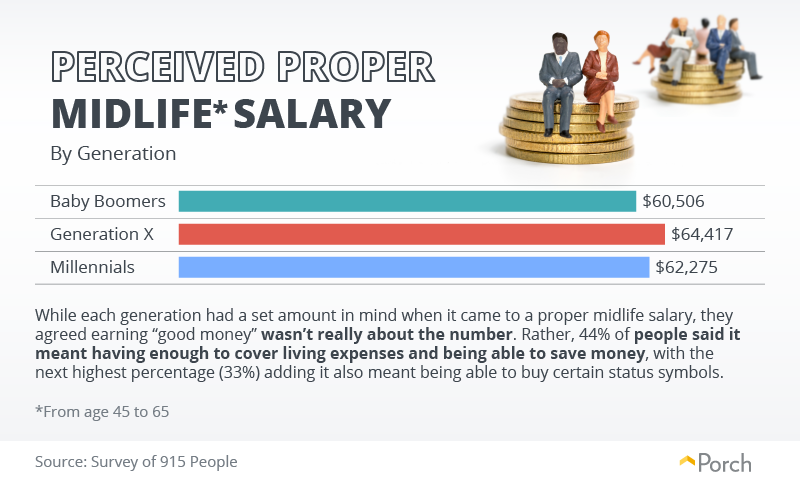
Of course, the amount of money you take home isn’t a direct indicator of wealth. For example, baby boomers thought earning around $60,000 was a decent midlife salary. Millennials said a tad over $62,000 was about right, and Gen Xers came in slightly higher at $64,417.
Cost of living can definitely impact how far those dollars go. If you live and work near or in the San Francisco metro area, your $60,000 won’t go as far given the city’s average salary is over $86,000 compared to earning the same amount in a smaller, midwestern community where housing prices and the overall cost of living is less expensive.
Home prices are a huge consideration as well. In Atherton, California, the median list price for a home in 2017 approached $10 million. Move over to Palo Alto, and it does dip slightly, at just over $7 million.
If you’re looking for the best median home price, consider moving away from either coastline, toward Marion, Indiana. There you’ll find a median home price of $66,750.
Regardless, of where you live or the price of your home, keeping it repaired and up to date is essential if you want to preserve the property value and curb appeal of your most significant investment.
Getting the most out of life
Forrest Gump, the fictional philosopher and world-class table tennis player from rural Alabama, may have said it best: “Life is like a box of chocolates. You never know what you’re going to get.”
That’s partially true, but with proper planning and guidance, you have the opportunity to craft the life you desire. Part of that comes with knowing when to tackle projects yourself and when to find qualified professionals who are dependable experts in their field.
We might not be able to control Aunt Sarah’s loose tongue or the speed at which she throws back a martini, but the people at Porch can make finding home professionals a snap. When you chat online with a Porch Home Assistant, there is no judgment—only dedicated people willing to help homeowners feel good about completing their next home remodel.
Methodology
We collected the opinions, goals, and recollections of 915 people from Amazon’s Mechanical Turk. The demographics of our participants were 52.7 percent women, 47.2 percent men, 0.1 percent nonbinary, and 0.1 percent transgender. They ranged in age from 18 to 81 with a mean of 34 and a standard deviation of 12. Twenty-five respondents did not report their generation, and as such, their responses were excluded from generational calculations. Generation Z and the Silent Generation were excluded due to low sample sizes, and all generations represented in the graphics included a minimum of 99 respondents each.
Limitations
We did not survey the parents of these respondents, and any information provided about the attitudes of the parents of these generations was received directly from the respondents. The goals analyzed in the first asset were reported in retrospect and respondents were asked specifically about their life goals between the ages of 18 and 25, as well as their parents’ life goals for them during the same period. These data were collected using self-reporting and, while valuable, can be subject to some of the following: selective memory, telescoping, attribution, and exaggeration. We did not statistically test these data and, as such, any claims are presented on means alone. This project is exploratory in nature, and we welcome future rigorous research on the topic.
Sources
- https://porch.com/project-cost/paint-a-house
- http://www.toyhalloffame.org/toys/game-life
- https://www.usnews.com/news/business/articles/2017-11-16/who-invented-game-of-life-court-aims-to-find-out
- https://shop.hasbro.com/en-hk/product/the-game-of-life-my-dream-job-promo-pack-game:8F0B88A4-6D40-1014-8BF0-9EFBF894F9D4
- https://thehill.com/homenews/state-watch/326995-census-more-americans-have-college-degrees-than-ever-before
- https://www.ft.com/content/08037cd6-7ea7-11e8-8e67-1e1a0846c475
- https://militarybenefits.info/history-of-the-gi-bill/
- https://porch.com/seattle-wa/roofing-repair/cs
- https://www.census.gov/content/dam/Census/library/visualizations/time-series/demo/families-and-households/ms-2.pdf
- https://www.cnbc.com/2018/08/09/millions-of-millennials-are-locked-out-of-homeownership-heres-why.html
- https://www.nytimes.com/2017/01/06/opinion/the-home-buying-decision.html
- https://relevantmagazine.com/life/whole-life/are-millennials-being-judged-unfairlyhttps://www.cnbc.com/2018/03/05/its-high-time-gen-x-takes-retirement-seriously.html
- https://business.tutsplus.com/tutorials/what-do-you-do-for-a-living–cms-29548
- https://www.payscale.com/research/US/Location=San-Francisco-CA/Salary
- https://www.businessinsider.com/most-expensive-housing-zip-codes-in-america-2017-12
- https://247wallst.com/housing/2018/01/20/americas-10-cheapest-housing-markets/
- https://www.msn.com/en-au/video/w/forrest-gump-life-is-like-a-box-of-chocolate/vp-BBLj1Yg
- https://porch.com/home-projects/remodeling
- https://porch.com/ask-a-pro
Fair Use Statement
It’s true that some have experienced pressure to achieve specific life objectives, but rest assured there is no pressure from us to share this exciting data with your readers. As long as it’s for noncommercial purposes, we’re all for it. Our single request is you link back to this page so readers can take advantage of the complete study.
